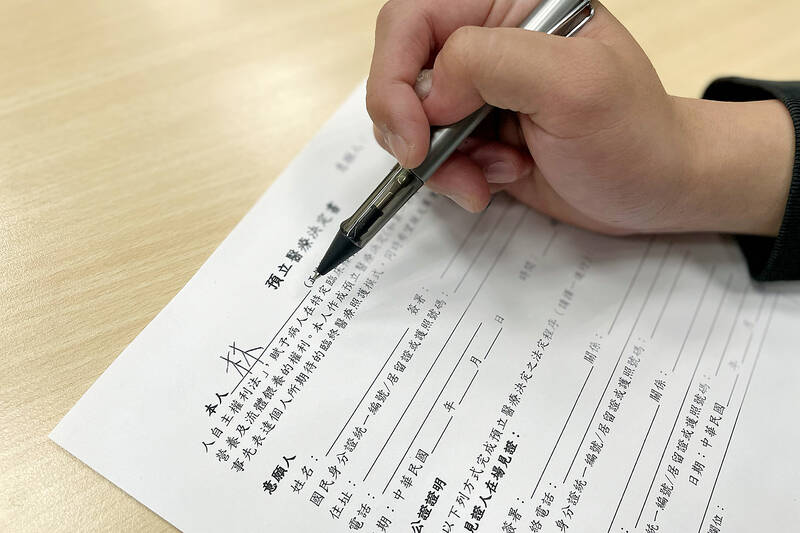Less than 1 percent of 19.6 million adults in Taiwan have signed a living will, the Patient Autonomy Research Center (PARC) said yesterday as it marked the fifth anniversary of the enactment of the Patient Right to Autonomy Act (病人自主權利法).
The legislation was the first special act in Asia to protect patient autonomy and dignity of life, allowing adults of sound mind to go through a process of advance care planning (ACP) and sign an advance decision for instructions for treatment or refusal of treatment when facing medical situations including terminal diseases, irreversible comas and dementia.
Even though in fewer than 360 days, Taiwan is expected to become a super-aged society, only 68,000 people have signed an advance decision as of last year, which includes about 24,000 people last year, showing that there is a lot of room for improvement, PARC marketing division head Chiu Yu-chen (邱宇晨) said.

Photo: Chiu Chih-jou, Taipei Times
ACP teams consist of physicians, nurses, psychologist and social workers, and each team has different working methods, Chiu said, adding that heavy administrative work is one of the obstacles that is keeping the coverage rate low.
Regardless of whether consultations are conducted in groups or one-on-one, the team must make sure the individual has communicated with their family and clearly understand the contents of the documents they are to sign, so they usually take one to two hours.
For special cases, such as when people with dementia give inconsistent decisions, it might take even longer, she said, adding that as the outpatient sessions take a long time and so few people go through them, they do not garner a lot of National Health Insurance (NHI) points and income for health workers, so physicians are less willing to do them.
If there were greater incentives for ACP teams, they would be more motivated to provide high-quality services, which would boost the coverage rate, Chiu said.
Fees of NT$2,000 to NT$3,500 for the process also deter people, she added.
NHI Administration Director-General Shih Chung-liang (石崇良) said that people who are terminally ill, have mild dementia or an “unbearable or incurable disease” and are under home-based medical care would be eligible for a one-time NHI-funded ACP outpatient visit.
Many people are unwilling to go through the process because they must pay extra fees, so NHI funds this year would be reserved to cover ACP, with the policy taking effect from the middle of the year at the earliest, Shih said.
People with terminal illness have NHI coverage for hospice and palliative care, and family medical consultations, and the one-time ACP consultation would be covered as a family medical consultation, he said.
People with profound dementia cannot undergo the process, so the second eligible group are those with mild dementia who have some independence and a clinical dementia rating of 1 or below, he said.
Another group to be eligible for the coverage is those in the Home-based Medical Integration Program, including those with reduced mobility or disabilities, but who clearly have the awareness to undergo the process, he said.

US PUBLICATION: The results indicated a change in attitude after a 2023 survey showed 55 percent supported full-scale war to achieve unification, the report said More than half of Chinese were against the use of force to unify with Taiwan under any circumstances, a survey conducted by the Atlanta, Georgia-based Carter Center and Emory University found. The survey results, which were released on Wednesday in a report titled “Sovereignty, Security, & US-China Relations: Chinese Public Opinion,” showed that 55.1 percent of respondents agreed or somewhat agreed that “the Taiwan problem should not be resolved using force under any circumstances,” while 24.5 percent “strongly” or “somewhat” disagreed with the statement. The results indicated a change in attitude after a survey published in “Assessing Public Support for (Non)Peaceful Unification

The CIA has a message for Chinese government officials worried about their place in Chinese President Xi Jinping’s (習近平) government: Come work with us. The agency released two Mandarin-language videos on social media on Thursday inviting disgruntled officials to contact the CIA. The recruitment videos posted on YouTube and X racked up more than 5 million views combined in their first day. The outreach comes as CIA Director John Ratcliffe has vowed to boost the agency’s use of intelligence from human sources and its focus on China, which has recently targeted US officials with its own espionage operations. The videos are “aimed at

SHIFT: Taiwan’s better-than-expected first-quarter GDP and signs of weakness in the US have driven global capital back to emerging markets, the central bank head said The central bank yesterday blamed market speculation for the steep rise in the local currency, and urged exporters and financial institutions to stay calm and stop panic sell-offs to avoid hurting their own profitability. The nation’s top monetary policymaker said that it would step in, if necessary, to maintain order and stability in the foreign exchange market. The remarks came as the NT dollar yesterday closed up NT$0.919 to NT$30.145 against the US dollar in Taipei trading, after rising as high as NT$29.59 in intraday trading. The local currency has surged 5.85 percent against the greenback over the past two sessions, central

STEADFAST FRIEND: The bills encourage increased Taiwan-US engagement and address China’s distortion of UN Resolution 2758 to isolate Taiwan internationally The Presidential Office yesterday thanked the US House of Representatives for unanimously passing two Taiwan-related bills highlighting its solid support for Taiwan’s democracy and global participation, and for deepening bilateral relations. One of the bills, the Taiwan Assurance Implementation Act, requires the US Department of State to periodically review its guidelines for engagement with Taiwan, and report to the US Congress on the guidelines and plans to lift self-imposed limitations on US-Taiwan engagement. The other bill is the Taiwan International Solidarity Act, which clarifies that UN Resolution 2758 does not address the issue of the representation of Taiwan or its people in